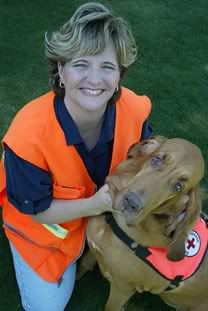St Bernard Dog Photo Copyright by Oni Saints
One of my recent dog training cases involved meeting a wonderful Saint Bernard who is too large for his human.
He apparently went through training as a puppy–but you would never know it.
Fortunately he is a gentle giant but has trouble focusing.
Attention deficit disorder of the canine kind…
Now don’t get me wrong, he does pay attention but his owner didn’t think he did–because he doesn’t ever look at her.
He is busy scoping out the environment and not motivated (or trained) to give eye contact.
Most people think that if their animals are not looking at them then they are not paying attention to them–so they strive to get in front of the critter and bend down to get in the face of the pet.
This is not a good tactic. What most people miss are the subtle cues the animal gives to acknowledge them.
Eye contact is something that has to be taught to many species because it is impolite (or a threat) to give direct eye contact in most.
Now this dog acknowledges that he is listening with the slight wag of his tail but he doesn’t look at the person who is talking to him.
He listened but didn’t necessarily respond with eye contact.
I told the owner it was not a big issue because we can always shape what we want later.
The dog did respond with behavior changes–just not with eye contact.
One of the other problems is that the owner cannot physically control him–but that isn’t how you really control and animal is it?
What I mean is, the animal has to be motivated to respond and most animal training has more to do with the psychology behind getting the behaviors, motivating the animal to respond to the cue aka command, and then performing those behaviors when asked.
When I started my career, the marine mammals I met had to be interested in working or playing with you–or they didn’t.
Unfortunately, when it comes to the domesticated animals–people think that they need to use the training tools to control the animal or to force it to respond.
But what you really have to do is to motivate and interest the animal.
In this case, the dog is highly motivated by touch. He will take treats but isn’t that into them.
In fact, he spent more time spitting them out when we attempted to reward his initial responses and keep him focused.
He responded better to petting and rubbing–and verbal praise was a winning strategy too.
Many people think that you have to use food to train animals…but it is only one of many tools in the toolbox.
Some animals are not motivated by food or perhaps so high strung that they won’t take food under the stress of training or a new environment.
So what do you use as rewards in those cases?
You have to be creative.
In the case of the Saint Bernard touch was the big winner.
Other animals (let’s look at dogs) might respond to a toy (ball) or playtime.
You can also train a secondary reinforcer (clicker, whistle, etc) that is paired with a primary reinforcer (such as treats) in a low stress environment and then use that secondary reinforcer in the conditions where the animal will not (or cannot) take a treat.
Now the other challenging thing in this case is that the client has some physical limitations that prevent her from being able to control the dog on a leash and collar.
What a joy to see her walking the dog calmly and learning how to relax instead of tensing up and fearing that she would fall or be knocked over by this giant.
He got excited and actually started giving us intermittent eye contact during this session–but contrary to common belief–we didn’t need it to get the behavior we wanted.
Have you ever been in a conversation with someone who wouldn’t give you eye contact?
You probably found that the harder you tried to accomplish that goal–that the more the person would not look at you.
That is normal for that particular social style of human–they don’t look you in the eye much.
The behavior was similar with this dog so although we will train eye contact later–it is not necessary to accomplish our goals of animal management and good behavior at this point.
Because of his strength and his owner’s lack of dexterity and strength (and small size) I opted to use a Halti head control device.
It works much like a horse halter. If you control the head of the animal then you control the animal.
Training him to accept it was pretty quick and easy–although I will have her work on it for at least a week so he really has a positive association with it.
However getting her to stop using the leash to try and control her dog is another story!
People are so conditioned to forcing their animals to do things-and it takes time to change lifelong human habits.
Fortunately, she is excited about motivating her animal to respond willingly–and without the struggle.
So how about you? Have you had trouble getting an animal to look you in the eye? Is your butt ever in the air while to try to get an animal to peer up at you?

 Another new area that is growing in the animal field is that of crime and legal related animal careers.
Another new area that is growing in the animal field is that of crime and legal related animal careers.
